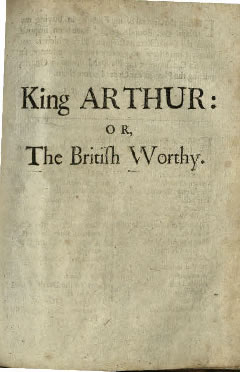King Arthur: Or, The British Worthy
You may click on the thumbnail images to view them full screen
John Dryden, King Arthur: Or, The British Worthy. (London: Jacob Tonson, 1691)
King Arthur: Or, The British Worthy (1691) is a 'dramatick opera' written by John Dryden, set on music by Henry Purcell. In his original take on King Arthur's conquering of the Saxons Dryden offers us a multi-layered tale about a Christian king's struggle against a heathen king, both for ownership of the Kingdom of Kent and for the hand in marriage of Emmeline, the King of Cornwall's daughter.
Dryden's King Arthur was the second half of a patriotic opera project in honour of Charles II, with the first part or prologue being Albion and Albanius, an Opera (with music by Louis Grabu). Charles II died before Albion and Albanius was staged,and Dryden had to now make sure the opera equally applied to his successor James II. By the time Dryden finished King Arthur: Or, The British Worthy yet another King, William of Orange, was on the throne.

King Arthur Mr.Dryden 1691 Fronticepiece AM:
The playbook in the collection is a first edition of Dryden's King Arthur: Or, The British Worthy, printed as a quarto in 1691 by Jacob Tonson, Dryden's regular publisher since 1679.

King Arthur Mr.Dryden 1691 Title Page AM:
Besides the title and author, the very busy title page displays valuable information about where the play was performed. The play was staged at the Dorset Garden Theatre, also known as the Queens Theatre from 1685 onwards. The brainchild of William Davenant, the Dorset Garden Theatre was especially suited to the performance of dramatick opera and its use of machines.
Dryden further used the title page to exhibit his appreciation for the classics by quoting Virgil and Horace, two authors whose work he also translated.
The copy was printed in 1691 by Jacob Tonson at the Judges Head in Chancery Lane near Fleet Street.

King Arthur Mr.Dryden 1691 Prologue AM:
The collection's copy of the playbook has a Prologue, and therefore must be a second issue of the first edition. The first issue – which was also published in 1691, although most likely before the opera was performed – lacks the Prologue and Epilogue. The Prologue was delivered by Thomas Betterton, who performed the role of King Arthur. Besides being a great actor of the Restoration stage, Betterton was also an author, a theatre manager, and a promoter of 'dramatick opera'.